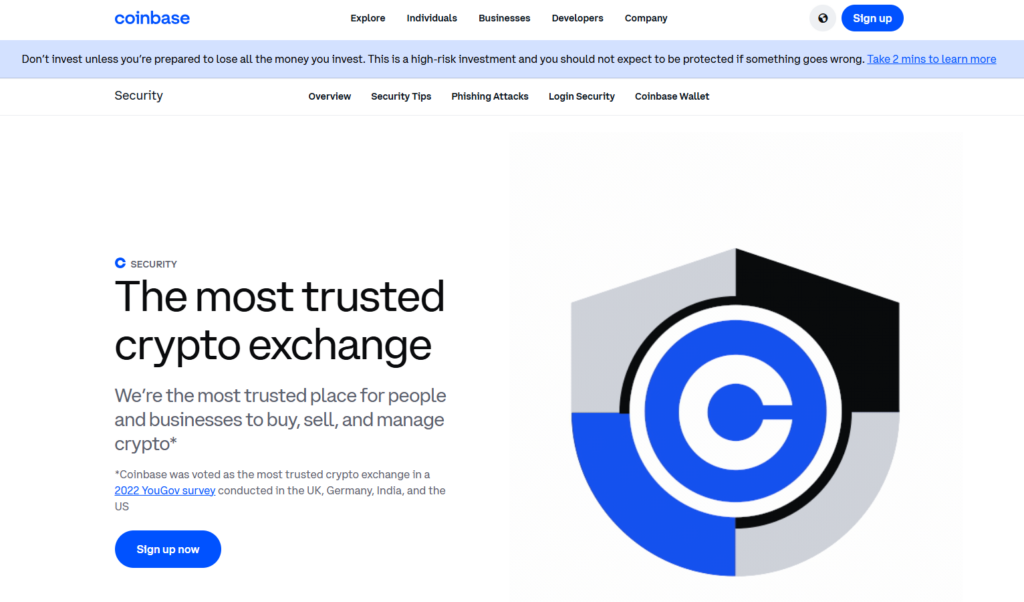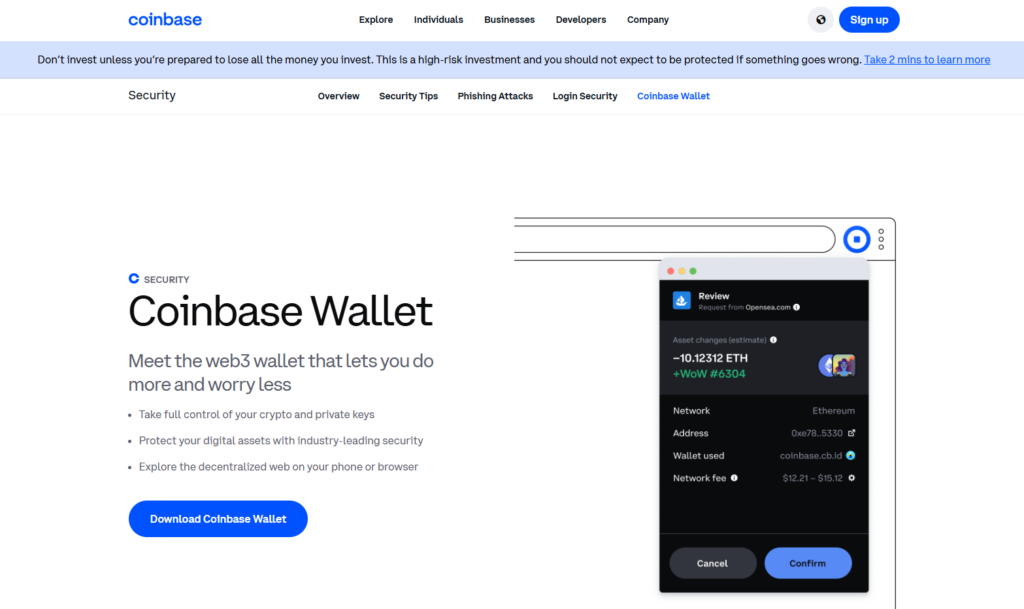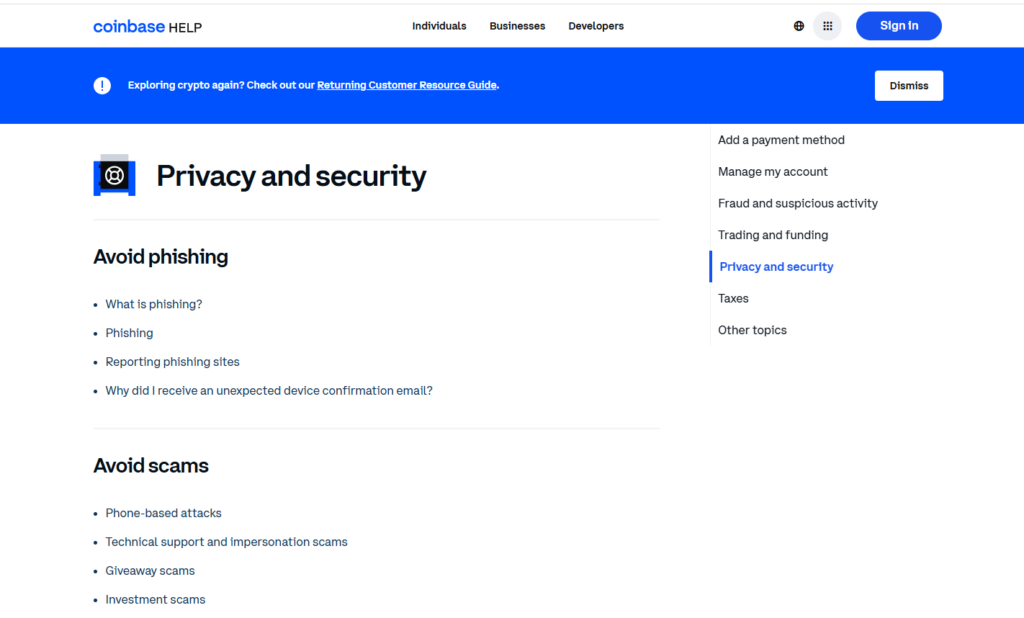Is Coinbase Safe?

Adam Woodhead
Co-Founder
Adam is a Co-Founder and content creator for The Investors Centre. His key areas of interest and expertise are cryptocurrency and blockchain technology.
Twitter ProfileAuthor Bio

Thomas Drury
Co-Founder
Seasoned finance professional with 10+ years' experience. Chartered status holder. Proficient in CFDs, ISAs, and crypto investing. Passionate about helping others achieve financial goals.
Twitter ProfileAuthor Bio
Fact Checked
How we test
At The Investors Centre, we pride ourselves on our rigorous fact-checking process. To delve deeper into our meticulous testing procedures and discover how we ensure accuracy and reliability, visit our dedicated page on how we test.
Risk Warning
Don’t invest unless you’re prepared to lose all the money you invest. This is a high-risk investment and you should not expect to be protected if something goes wrong. Take 2 mins to learn more.
Updated 05/04/2025
This article examines whether Coinbase is a safe platform for cryptocurrency trading, focusing on its security features, regulatory compliance, and potential risks Reports of crypto fraud increased by over 40% globally in 2023, highlighting the importance of choosing a secure platform.
Coinbase, one of the most popular cryptocurrency exchanges, has built a reputation as a trusted and beginner-friendly option. But how safe is it really? This article explores Coinbase’s security features, regulatory compliance, and potential risks to help you make an informed decision.
Quick Answer: Is Coinbase Safe?
Yes, Coinbase is considered safe due to its strong security measures, including 98% cold storage of funds, two-factor authentication (2FA), and FCA regulation in the UK. However, users should implement additional security practices, as custodial wallets mean Coinbase controls private keys
What Is Coinbase? A Quick Overview
Coinbase is one of the oldest and most well-established cryptocurrency exchanges in the world. Launched in 2012, it has grown to serve over 100 million users globally, offering access to more than 200 cryptocurrencies. For UK investors, Coinbase stands out as a regulated exchange under the Financial Conduct Authority (FCA).
| Feature | Details |
|---|---|
| Founded | 2012 |
| Headquarters | San Francisco, USA |
| User Base | Over 100 million users globally |
| FCA Regulation in UK | Yes |
| Supported Cryptos | 200+ |
How Secure Is Coinbase? A Deep Dive into Its Safety Features
When it comes to security, Coinbase sets a high standard among cryptocurrency exchanges. Let’s break down the platform’s key safety measures, ensuring users understand how their funds and data are protected.
Platform Security
Coinbase employs industry-leading security measures to safeguard user funds and platform operations. One of its standout features is its use of cold storage, where 98% of customer funds are stored offline to protect them from hacking attempts. Only a small portion of funds is kept online, and these are insured to cover losses in case of platform-wide breaches.
Additionally, all communication with Coinbase’s servers is encrypted using SSL, ensuring that data exchanged between users and the platform is secure. Coinbase also runs regular security audits and collaborates with external experts to identify and fix vulnerabilities. These proactive steps demonstrate a commitment to providing a secure environment for trading.
Account Protection
Coinbase offers several tools to protect individual accounts:
- Two-Factor Authentication (2FA): Users can activate 2FA via SMS, email, or authentication apps, adding an extra layer of login security.
- Biometric Login Options: For app users, fingerprint and facial recognition features ensure accounts can’t be accessed without proper identity verification.
- Withdrawal Whitelists: This feature allows users to set approved wallet addresses, ensuring funds can only be withdrawn to trusted locations.
These measures work together to secure user accounts and significantly reduce the risk of unauthorized access.
Regulatory Compliance and Transparency
For UK investors, Coinbase is particularly appealing because it is registered with the Financial Conduct Authority (FCA), ensuring adherence to strict anti-money laundering (AML) and know-your-customer (KYC) regulations. This level of oversight provides users with added confidence in the platform’s legitimacy.
Coinbase also maintains a high degree of transparency by publicly reporting operational and security practices. It regularly releases proof of reserves to demonstrate that it holds sufficient funds to back user balances, reinforcing trust among its global user base.
| Security Feature | Details |
|---|---|
| Cold Storage | 98% of funds stored offline for maximum security |
| Two-Factor Authentication | 2FA via SMS, email, or authentication apps |
| Insurance | Covers funds stored on the platform (excludes individual account breaches) |
| Biometric Login | Fingerprint and facial recognition for app users |
| Regulatory Compliance | FCA registration and adherence to AML/KYC requirements |

Coinbase Hacks and Security Incidents
Has Coinbase Ever Been Hacked?
Yes—despite its strong security reputation, Coinbase has experienced a number of incidents over the years.
One of the most notable occurred between March and May 2021, when hackers exploited a flaw in Coinbase’s SMS-based two-factor authentication. This allowed unauthorized access to approximately 6,000 user accounts. Coinbase moved quickly to resolve the issue, reimbursed affected users, and implemented additional security measures.
In February 2023, a member of the hacker group “0ktapus” used social engineering to trick a Coinbase employee, gaining limited internal contact information. Importantly, no customer data or funds were compromised. The company acted swiftly and transparently, reinforcing its internal protocols to prevent similar incidents.
In 2025, Coinbase was again in the spotlight after a supply chain attack targeted its GitHub repositories. A malicious actor was able to access CI/CD secrets from several open-source projects. Coinbase responded immediately to secure its infrastructure and assess the impact, demonstrating its commitment to security.
How Has Coinbase Responded to Security Breaches?
Coinbase has consistently addressed incidents with transparency and urgency. In each case, it has taken immediate steps to contain the breach, inform affected users, and reinforce its defenses.
The company’s willingness to reimburse users and openly share details about what happened—and what was done to prevent recurrence—has helped preserve its reputation and build ongoing trust with its user base.
What Types of Scams Target Coinbase Users?
Even if the platform itself isn’t compromised, individual users are often targeted by scammers through various phishing tactics. Common examples include:
Phishing emails designed to mimic official Coinbase messages and steal login details.
Fake support calls from fraudsters pretending to be Coinbase staff.
SMS phishing (smishing) that uses alarming messages to trick users into revealing personal information.
Coinbase provides educational resources to help users recognize and avoid these scams. Users are strongly encouraged to use multi-factor authentication and to be cautious of unsolicited messages or requests for sensitive information.
Coinbase Wallet vs Exchange
Which Is Safer: Coinbase Wallet or Coinbase Exchange?
When it comes to keeping your crypto safe, the choice between Coinbase Exchange and Coinbase Wallet comes down to how much control—and responsibility—you want over your assets.
Coinbase Exchange is a custodial platform. This means Coinbase manages your private keys, handles storage, and provides the security infrastructure. For many users, especially beginners, this offers peace of mind. Your assets are protected by advanced security protocols, including cold storage for the majority of funds, insurance against certain breaches, and 24/7 monitoring. If you forget your login or lose access to your account, Coinbase can help you recover it.
Coinbase Wallet, by contrast, is self-custodial. You hold your own private keys, and only you can access your funds. This gives you full control, but also places the responsibility for security entirely on your shoulders. There’s no “forgot password” option—if you lose your 12-word recovery phrase, your funds are gone for good.
What Are the Security Strengths of Each?
Coinbase Exchange:
Assets stored in cold storage, away from online threats.
Protected by two-factor authentication and anti-phishing tools.
Backed by insurance policies (though only under specific conditions).
Coinbase can assist in account recovery.
Coinbase Wallet:
Private keys are stored locally on your device.
Supports biometric login and hardware wallet integration.
Protected by Secure Element chips and strong encryption.
You are the only one with access—there’s no central point of failure.
So, Which Should You Use?
If safety to you means professional-grade infrastructure, insurance, and account recovery, the exchange is likely the better choice.
If safety to you means eliminating third-party risk and having complete control over your assets, then the wallet may be the more secure option—provided you’re confident in managing your own keys and recovery phrase.
Both options are secure in their own ways, but they serve different needs. Understanding the trade-offs between custody and control is key to choosing the right level of safety for you.
Risks and Limitations of Using Coinbase
While Coinbase is a trusted platform, it’s not without its drawbacks. Investors should be aware of potential risks and limitations before committing their funds.
Fees and Hidden Costs
One of the most common complaints about Coinbase is its high fee structure, which can be confusing for beginners. Fees vary depending on the transaction type, with instant purchases via debit or credit card incurring significantly higher costs compared to bank transfers. Additionally, Coinbase Pro, the platform’s advanced trading service, offers lower fees, but it requires a separate account setup.
When compared to competitors like Binance or Kraken, Coinbase’s transaction fees are often higher, making it less cost-effective for frequent or high-volume traders. Beginners should carefully review the fee breakdown to avoid surprises.
Customer Support Challenges
Customer support is another area where Coinbase has faced criticism. Many users have reported slow response times during high-traffic periods, particularly when technical issues arise. Coinbase primarily relies on email-based support, with live chat or phone support available only in limited cases.
This can be frustrating for users who need immediate assistance, especially if account access or funds are at risk.
Custodial Wallet Risks
Coinbase operates as a custodial platform, meaning users do not have control over their private keys for funds stored on the exchange. While this makes the platform easier to use for beginners, it introduces risks. If Coinbase were to experience a breach or insolvency, users’ funds could be at risk.
For greater security, long-term investors are encouraged to transfer their assets to a non-custodial wallet or hardware wallet, where they have full control over their private keys.
| Risk | Details |
|---|---|
| High Fees | Transaction and conversion fees higher than some competitors |
| Custodial Wallets | Users don’t control private keys for funds stored on Coinbase |
| Customer Support | Limited and slow response times during high-traffic periods |
| Hacking Target | Centralized exchanges are frequent targets, though Coinbase is insured |

Is Coinbase Safe for Beginners?
Coinbase is widely regarded as one of the best platforms for beginners entering the world of cryptocurrency. Its user-friendly interface is designed to make buying, selling, and storing crypto simple and accessible. Navigating the platform is intuitive, even for users with no prior experience.
The onboarding process is another strength, with step-by-step guidance that takes new users through account creation, KYC verification, and their first cryptocurrency purchase. Combined with safety features such as two-factor authentication (2FA), insurance coverage for platform-wide breaches, and withdrawal whitelists, Coinbase provides a secure environment for beginners.
Additionally, Coinbase offers educational resources like in-app tutorials and “Coinbase Learn,” where users can earn small amounts of cryptocurrency while learning the basics of crypto trading and security.
| Feature | Why It’s Beginner-Friendly |
|---|---|
| User Interface | Simple, intuitive design for easy navigation |
| Onboarding Process | Step-by-step guidance for account setup and buying cryptocurrency |
| Security Features | 2FA, insurance, and withdrawal whitelists for added protection |
| Educational Resources | In-app tutorials and Coinbase Learn for crypto education |

Tips to Maximize Your Security on Coinbase
While Coinbase is a secure platform, taking additional precautions is essential to ensure the safety of your funds and account.
- Enable Two-Factor Authentication (2FA): Adding 2FA makes it significantly harder for unauthorized users to access your account.
- Set Up Withdrawal Whitelists: Limit fund withdrawals to pre-approved wallet addresses for added control.
- Use Strong, Unique Passwords: Regularly update your password and avoid using the same one across multiple platforms.
- Consider a Hardware Wallet: Store large holdings offline in a hardware wallet like Ledger or Trezor for maximum security.
- Monitor Transactions: Regularly check your account for unusual activity to detect threats early.
| Security Tip | How It Helps |
|---|---|
| Enable 2FA | Adds an extra layer of account protection |
| Withdrawal Whitelists | Ensures funds can only be withdrawn to pre-approved addresses |
| Use a Strong Password | Reduces the likelihood of unauthorized account access |
| Consider a Hardware Wallet | Keeps large holdings offline for maximum security |
| Monitor Transactions | Detects unusual activity quickly |
Conclusion: Should You Use Coinbase?
Coinbase stands out as one of the safest and most reputable cryptocurrency exchanges, particularly for beginners. Its robust security measures, including 98% cold storage, 2FA, and FCA compliance in the UK, make it a trusted platform for buying and storing crypto.
However, users should be mindful of its high fees and custodial nature, which means they don’t control private keys. Balancing these factors, Coinbase is a solid choice for those prioritizing safety and ease of use.
Final Tip: While Coinbase is secure, maximize your protection by enabling 2FA and storing large holdings in a hardware wallet.
Trade Smarter, not Harder
- Copy Trading
- Competetive Fee's
- Multi Asset Platforn
Don’t invest unless you’re prepared to lose all the money you invest. This is a high-risk investment and you should not expect to be protected if something goes wrong. Take 2 mins to learn more.
FAQs
Yes, Coinbase insures funds held on the platform, but personal account breaches are not covered.
Yes, Coinbase complies with legal requests and shares data as required under regulations like AML and KYC laws.
Yes, funds may be at risk if your account is hacked, so strong security practices are essential.
Platform-held funds are insured, but Coinbase has a history of strong security to minimize this risk.
Coinbase is more regulated and beginner-friendly, while Kraken and Binance may offer lower fees but less stringent oversight.



